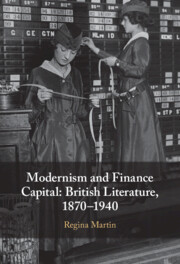Book contents
- Modernism and Finance Capital
- Modernism and Finance Capital
- Copyright page
- Dedication
- Contents
- Acknowledgments
- Introduction
- Part I From Victorian Character to Modernist Professional
- Part II Finance Capital and the Economic and Cultural Turn toward London
- Part III Modernism, Affect, and the Rise of the Modern Corporation
- Conclusion
- Works Cited
- Index
- References
Works Cited
Published online by Cambridge University Press: 12 December 2024
- Modernism and Finance Capital
- Modernism and Finance Capital
- Copyright page
- Dedication
- Contents
- Acknowledgments
- Introduction
- Part I From Victorian Character to Modernist Professional
- Part II Finance Capital and the Economic and Cultural Turn toward London
- Part III Modernism, Affect, and the Rise of the Modern Corporation
- Conclusion
- Works Cited
- Index
- References
- Type
- Chapter
- Information
- Modernism and Finance CapitalBritish Literature, 1870–1940, pp. 200 - 213Publisher: Cambridge University PressPrint publication year: 2024

